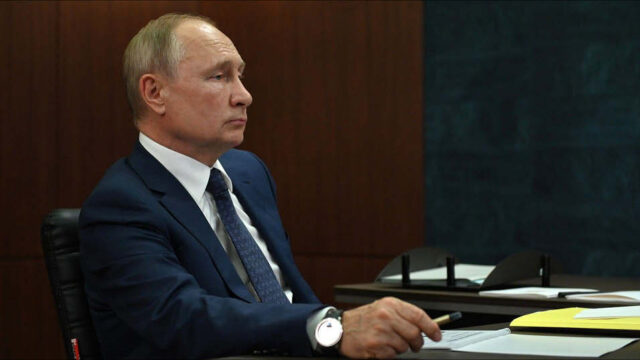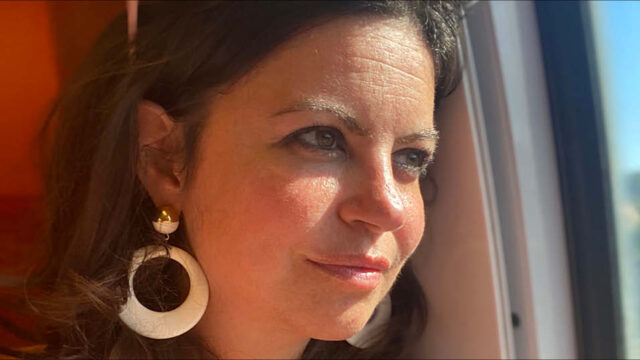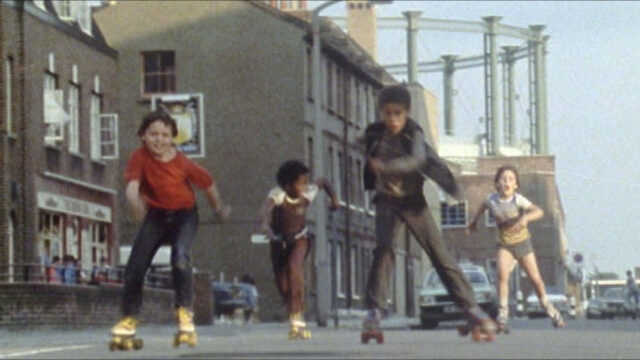There’s strong demand among broadcasters across the board for documentary driven by directing talent with a passionate point of view. Pippa Considine reports
Authored documentary – those films rooted by conviction, passion and the personal stamp of the filmmaker – are in high demand. The biggest names, such as Kim Longinotto, Adam Curtis, James Marsh, Norma Percy, add legendary status to a project. But the boom in documentary over the last decade or more has given space for a generation of distinctive film makers to carve a reputation for telling the stories that they believe in, with their own hallmark.
“There’s a strong desire from broadcasters and streamers for films made by top directors,” says Brian Woods, founder of True Vision and BAFTA and Emmy winning director, producer of 2022 Grierson winner The Missing Children, directed by Tanya Stephan.
Last year’s Grierson British Documentary Awards demonstrates the scope of demand. The BBC won five, Netflix three, ITV and Channel 4 took two and Apple TV+ and Disney+ landed one. Sky had four nominations.
“Having a really strong creative vision is essential to us,” says Poppy Dixon, director of Docs and Factual Commissioning for Sky. “It’s a crowded market and a lot of people are playing in the same spaces, sometimes even making documentaries on the same subjects – so having a distinctive voice is so important to stand out.”
James Rogan has a director credit on two films on The Grierson Trust’s 50 must-see docs of the last 50 years: Uprising and Stephen: The Murder that Changed a Nation. “You put your whole self into the films you make,” he says. “You should care that much about the stories you tell because they are about people’s lives, so you should be clear about your reasons for telling them.”

On-screen authors
With on-screen author documentary makers, such as David Attenborough, Mobeen Azhar, Stacey Dooley, Louise Theroux, their engagement with the subject is there for all to see. Their star has been rising as the public’s interest in documentaries has waxed.
BAFTA and Emmy winning director Brian Woods has worked with Stacey Dooley on a number of productions. “Stacey and Louis are good examples. They’re not presenters for hire…they’re very much embedded in the production process.”
At Mindhouse, creative director Arron Fellows is a co-founder alongside Theroux. With this reputation for personal engagement, Mindhouse has also made Alice Levine’s series Sex Actually and David Baddiel: Jews Don’t Count, both for Channel 4. “We love that collaboration with people with a point of view, it’s always a team effort,” says Fellows.
On-screen filmmaker talent has had less traction with streamer documentaries, where finding an internationally recognised anchor is a challenge, even more so where they double as filmmaker. Beyond Attenborough, Bertie Gregory has come into the frame, with Disney+ ordering Epic Adventures with Bertie Gregory.
The sense of authorship often comes through an on-screen personality. “There’s been a wave of authored docs in the sense of celebrity led film,” says Woods. Films fronted by Anton Ferdinand, Chris Packham, David Harewood feature in recent BAFTA nomination lists. “To the audience, the author is the presenter,” observes Woods. True Vision’s recent film about model Danielle Lloyd and domestic abuse, directed by Katy Sheppard, is another.
Kim Longinotto is currently working on Dalton’s Dream which follows young Jamaican X Factor winner Dalton Harris. The founder and CEO of Dare Productions Derren Lawford is producing. “Kim is always interested in meaningful stories and issues…and there are so many issues that come out through following his life…. It’s about how he deals with the music industry, homophobia, mental health, his own family trauma,” says Lawford.
NORMA PERCY
It’s all about teamwork, says film maker Norma Percy, executive producer, Brook Lapping.
“The authored documentary is a wonderful thing and its existence is what makes British documentaries special. But it’s actually a lie. Making television is a communal activity: one person can write a novel or a newspaper article, but to make a good documentary several people have to do their job superlatively.
To make our recent BBC series Putin vs the West, the author was the series director Tim Stirzaker, producer/directors Max Stern and Lotte Murphy-Johnson, executive producer Lucy Hetherington, editors Toby Marter, Cathy Houlihan and Pierre Haberer, researcher Olivia Bernhardt Brogan, and even a little bit myself. What’s crucial to make a Norma Percy documentary is that the same team be involved from the beginning to the end of the process. In our case, it’s a long and laborious process. To make the series that we are known for, which let viewers see what it’s like inside the room at the moments when the big international decisions are made, it takes time for research even to find a subject, and then preliminary interviews to find out what happened inside the room, even before we come to film. And then there’s editing: putting together people’s stories takes a lot more time than just writing a script and dropping in the odd plum of an interview. It’s absolutely crucial that the people who did the research are around for every stage down to the last minute.
Is there a threat to serious documentaries? I’ve been doing my thing for 40 years and I think the fact that it’s still around shows that it’s a pretty hardy beast. But if there’s a threat, it’s the attempt to save money by lopping off people as you go or not hiring enough producer/directors from the beginning, and instead hiring edit producers who haven’t lived and breathed the subject for the last six months. Long live authored documentaries.”
Norma Percy is series producer on the BBC’s Putin vs The West
The name game
With many of the streamers still in their infancy, looking for break-out films, the demand for known documentary directing talent is still central. The Apple TV+ upcoming Boris Becker documentary is helmed by Alex Gibney and John Battsek; Disney+ new series on Camden music is from Asif Kapadia. While in 2020, one of Netflix biggest hits, An American Murder Next Door was directed by then relative unknown Jenny Popplewell, James Marsh was producer.
“It’s always reassuring to have someone whose work you know and admire leading on a project and can allow you to take risks on ideas which may have not been as fully developed,” says Dixon at Sky. “We’re working with Nick Green who’s doing his second project for us, (Zuckerberg), Collete Camden, whose work I’ve always admired, who is directing Gone: Ireland’s Vanishing Triangle, or Sam Hobkinson, who I’ve worked with a lot, and always handles stories with a twist deftly and creatively, as showcased in Devil’s Advocate: The Mostly True Story of Giovanni Di Stefano.”
On Dare’s slate there’s international co-production Crypto Queen, a series helmed by Rudolph Herzog. “There’s no doubt the crypto series having Rudolph attached from a very early point in the process and it being an idea he wanted to drive, definitely helped to attract the partners we have,” says Lawford. “Rudolph is quite unique, a European director who also has name recognition in the UK and the US.”
Netflix now has its commissioning team in the UK and buoyed by documentary success, is not so single-minded about named directors. But the international scope still weighs in. “It feels like you need a bigger package for streamers and that’s everything – director, subject matter, access,” says Lawford. “It’s a slightly more commercial matrix.”
Banijay’s Workerbee label recently announced a multi-project deal with Oscar winning director Kevin McDonald, with a streamer feature doc waiting in the wings.

Scripted directors pursuing a non-scripted passion project is a sweet spot. “People have recognised that documentary is one of the leading narrative mediums of our time, bringing a flood of big names from fiction,” says James Rogan.
BBC documentary series Uprising, which charted the impact of the New Cross Fire and its role in the Brixton riots, saw Rogan share a directing credit with Oscar winner Steve McQueen. Uprising was a response to the killing of George Floyd, bringing a UK perspective to the Black Lives Matter movement. “We understood there was a moment of reckoning around race relations,” says Rogan.
“When we think of films at Rogan Productions, the first thing we think of is perspective. Who is telling the story and why.”
Emma Hindley, lead commissioning editor at Storyville, says: “I like to think at Storyville we are always championing vital subjects – great stories, brilliantly told is our overriding principle – even if the stylistic approaches of the film makers differ.”
Recently, Storyville films range from Snow Hnin Ei Hlaing’s feature debut Midwives, an observational film about the complex relationship between a Buddhist Midwife and her Rohinga trainee in Myanmar; Bianca Stigter’s debut doc, 3 Minutes: A Lengthening which gives a window into pre–Holocaust Jewish life in Poland, told solely through a small amount of archive and voices.
Distinctive filmmaking means many different things. “It might be in the tone of the film, it might be in the stylistic choice, it might be in how they handle contributors,” says Poppy Dixon at Sky. “Anthony Phillipson set a style with Liverpool Narcos, which straddles playful and sincere, blending observational shooting with stylised drama, and Benedict Sanderson, directing our follow up Dublin Narcos, has brought his own voice to it, really bringing out the characters.”
True crime might not seem the clearest place for authorship, but director/producer Liza Williams’ BAFTA winning documentary The Yorkshire Ripper: A Very British Crime Story brought the focus onto 1970s attitudes to women. Mindhouse is working with Williams on her next project. Arron Fellows says: “she brought to [the Yorkshire Ripper story] something very individual, very personal, very specific.”
EMMA HINDLEY, STORYVILLE
Emma Hindley is Lead Commissioning Editor, BBC Storyville
“Storyville is the only platform for international feature length documentaries on the BBC and it has a hugely important reputation amongst documentary directors and makers the world over.
New voices and unusual stories are vital to Storyville – a large part of my job is to maintain Storyville’s legacy of excellence and eclecticism of storytelling whilst at the same time nurturing and helping newer voices to tell those stories themselves.
For too long, feature length docs have largely been the arena of male, white, heterosexual, middle class directors, producers and execs. Thankfully, the world is changing – one of my main ambitions is to ensure that wherever possible, our feature docs are made by a diverse range of folk, from a diverse range of countries, telling their own stories.
We have an up-coming film, Bowelbabe In Her Own Words, about the life and death of the cancer influencer, Deborah James. Director Sara Hardy and editor Gwyn Jones have made an extraordinary film that’s made entirely from archive, stills, insta and tik tok, with Deborah’s voice telling her own story.
I’m seeing a number of really interesting docs that have been co-directed – we have a brilliant doc coming up on Storyville, Blue Bag Life, in which artist Lisa Selby looks at the effect that her mother’s addiction had. It was not only co-directed by three people, but it was also shot entirely on mobile phones and it’s already winning prizes.
I’m very interested in the hinterland between drama and documentaries – especially in terms of past tense stories – there are an awful lot of films with talking heads, archive and reconstructions around and I’m really keen to see how we can make past tense stories in a different way. So, I’m working in development with a couple of film makers to see what new shapes and approaches they can come up with.”
Fresh faces
The industry is calling for more diverse voices. “There’s always space for strong authorial voices,” says Lawford. “It’s also important we have as many different perspectives authoring those stories.”
Dare has set out to champion new talent in the industry and diverse points of view. “We’re passionate about diversity, allyship, representation and empowerment,” says Lawford. It’s a wide embrace. He includes directors moving sideways into the industry, citing former cinematographer Alex Pritz and Grierson winner former photographer Alfred George Bailey.
Bringing people through takes commitment. Producer Riva Japaul has been shadowing Rudolph Herzog on the Crypto Queen series. Kim Longinotto is co-directing with upcoming Scottish film-maker Franky Murray Brown.
Grierson DocLab has been backing new talent in documentary since 2012. Amongst its alumni are Poppy Goodheart, director of Channel 4 First Cut film The Boy Who Can’t Stop Dancing, also producer of multi award-winning Locked In: Breaking the Silence. And Cherish Oteka who won a BAFTA in 2022 for their short documentary The Black Cop.
At the NFTS, which runs its Directing Documentary MA, recent graduates include Jessica Brady and Ghada Eldemallawy who both won Griersons; Hugh Clegg who has a comedic approach to his work; and Arnas Pigulevicius whose graduation film was shown at the London Film Festival.
BBC Three has been a good platform for new, young directors. It offers a home for a first film for those selected for the BBC New Director’s Scheme. Recent films from the scheme’s alumni include Eddie Hall: The Beast v The Mountain from director Olivia Isaacs, Defending Digga D, which won director Marian Mohamed the BAFTA for Emerging Factual Talent 2021, and Ziyaad Desai’s Bad Influencer: The Great Insta Con.

In 2022, Adam Brown, a former DP, followed Mohamed to the same BAFTA with Into the Storm: Surfing to Survive, screened on the BBC’s Storyville.
James Rogan remembers that after his first film, which was backed by Storyville, it was hard to get the second or third. “The industry needs to be mindful of those second and third films…You’re a distinctive voice, you can clearly do something, but you can’t do everything. That’s a difficult transition period.” Brian Woods agrees. “The new directors schemes are great,” he says. “The challenge is the second and third films.”
At Channel 4, home to For Sama, from film makers Waad Al-Kateab and Edward Watts and the Jeremy Kyle Show: Death on Daytime, directed by Kira Phillips, there’s room for debut films with its First Cut Brief. There’s also a relatively new pot for documentaries on All4. They’re after the next Seaspiracy, Supersize Me, The Great Global Warming Swindle and have put out a call for “the next generation gonzo film makers in the vein of Michael Moore and Chris Morris.”
Mindhouse is on the case with finding on-screen talent that stretches behind the camera too. “We’re always asked, ‘how do you get the next Louis Theroux?’ He’s been able to explore themes, subject matters that he’s interested in and he’s brought a following, an audience to him,” says Fellows. “The opportunity is whether we can push through more people and trust them to go out and make programmes which will then generate an audience.”
It takes confident leadership by the broadcasters. “It’s a brave decision for a commissioner to say this is how we’re going to approach this specific topic and we’re going to do it in a way which feels very distinctly this director, this person,” says Fellows.
At Sky, while known directors are important, they have made room for emerging talent. Its Docs Short initiative will fund projects from diverse and disabled directors. Sophie Cunningham gained her first directing credit on Sky film Look Away. Gussy Sakula-Barry directed Sky Crime series Fred West: The Glasgow Girls, “giving it a strong female perspective, highlighting the experiences of these forgotten women, including the domestic violence they suffered,” says Poppy Dixon. Upcoming is Georgina Cammaleri’s first film Right to Fight.
It’s harder to put an authorial stamp on the kind of box set retrospective films that are popular at the moment, but there’s still room for film makers to bring their voice. “They’ll still be able to put their mark, their stamp on films,” says Fellows.
Pippa Considine
Share this story

















